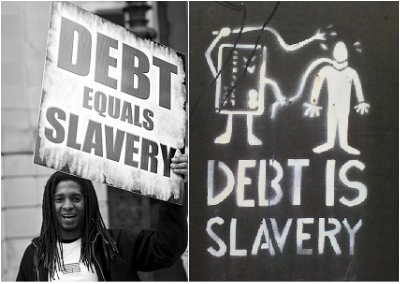|
Note: This article originally appeared at Women in Theology. “Credit is a means of privatization and debt a means of socialisation. So long as they pair in the monogamous violence of the home, the pension, the government, or the university, debt can only feed credit, debt can only desire credit. And credit can only expand by means of debt. But debt is social and credit is asocial. Debt is mutual. Credit runs only one way. But debt runs in every direction, scatters, escapes, seeks refuge.” (Fred Moten & Stefano Harney, The Undercommons, 61)  There are a variety of ways in which one can understand blackness’ relation to value. As I’ve tried to set out in the two previous posts, within the system of global racial capitalism, the position of the black is one of permanent indebtedness. Blackness is the exclusion from the social relations of the credible. It is the inescapable nature of one’s debt, which is one’s blackness. This indebtedness is the means by which the credibility of those who can be creditors or debtors is maintained. The value of credibility requires the devaluation of indebtedness, which is to say, requires seeing debt as a threat. Seeing blackness as a threat. Criminalization is the technique by which this devaluation of indebtedness is maintained. Criminalization is the process of seeing from within the capitalist field of vision. In this range of visibility, blackness is only recognizeable as the threat of indebtedness, which is the threat of poverty. To protect credibility from this threat is the role of the carceral, which says it seeks the rehabilitation of the criminal. This is true, as Moten and Harney show us. The carceral mode of governance is concerned with blackness—which is to say indebtedness, which is to say bad debt—because it is concerned with maintaining the value of credibility. The promise of value, of being recognized as valuable, is what is policed. Do we see people going about their lives as if credibility isn’t valuable? Those are the criminal, the always indebted, the black. Do we see people who understand that the promise of value money offers is paid for with their flesh and blood? Those are the criminal, the poor, the threats. Understanding criminality through racial capital must radically reorient our field of vision, where debt is the horizon, the limit of our thought. To transgress the limit of debt, to inhabit the space where the indebted have been living their non-credible criminal lives, is to make a move that reevaluates the value money promises. This movement is to understand, with Moten, that credit runs only one way (which is toward whiteness and the aspiration for credibility), while debt runs in all directions, to the Ferguson protests, the striking fast food workers, the undocumented laborers, the precarious adjuncts, the disappeared Mexican students, and, and, and … To understand blackness as debt, as criminal, is to understand the value of the double in black thought. That value, as it is given by the racialized economy of credit/debt, is not respected. The double does the work of inflating and undercutting the terms of respectability, the proper, the police. Indebtedness and criminality in black study, then, are ways of naming the fact that there is something happening over where the non-credible criminal lives are cohabitating. They are a way of understanding the value of credibility requires the governance of these non-credible criminal lives, or their destruction. In response to the violence that is the imposition of a violating indebtedness, the indebted criminal black violates property, propriety, and the credibility of whiteness, of the police which protect this credibility, and of the state which governs this credibility.
Comments
|
Disclaimer
The viewpoints expressed in each reader-submitted article are the authors own, and not an “official Jesus Radicals” position. For more on our editorial policies, visit our submissions page. If you want to contact an author or you have questions, suggestions, or concerns, please contact us. CategoriesAll Accountability Advent Anarchism Animal Liberation Anthropocentrism Appropriation Biblical Exegesis Book Reviews Bread Capitalism Catholic Worker Christmas Civilization Community Complicity Confessing Cultural Hegemony Decolonization Direct Action Easter Economics Feminism Heteropatriarchy Immigration Imperialism Intersectionality Jesus Justice Lent Liberation Theology Love Mutual Liberation Nation-state Nonviolence Occupy Othering Pacifisim Peace Pedagogies Of Liberation Police Privilege Property Queer Racism Resistance Resurrection Sexuality Solidarity Speciesism Spiritual Practices Technology Temptation Veganism Violence War What We're Reading On . . . White Supremacy Zionism ContributorsNekeisha Alayna Alexis
Amaryah Armstrong Autumn Brown HH Brownsmith Jarrod Cochran Chelsea Collonge Keith Hebden Ric Hudgens Liza Minno Bloom Jocelyn Perry Eda Ruhiye Uca Joanna Shenk Nichola Torbett Mark VanSteenwyk Gregory Williams Archives
October 2017
|
Search by typing & pressing enter


 RSS Feed
RSS Feed